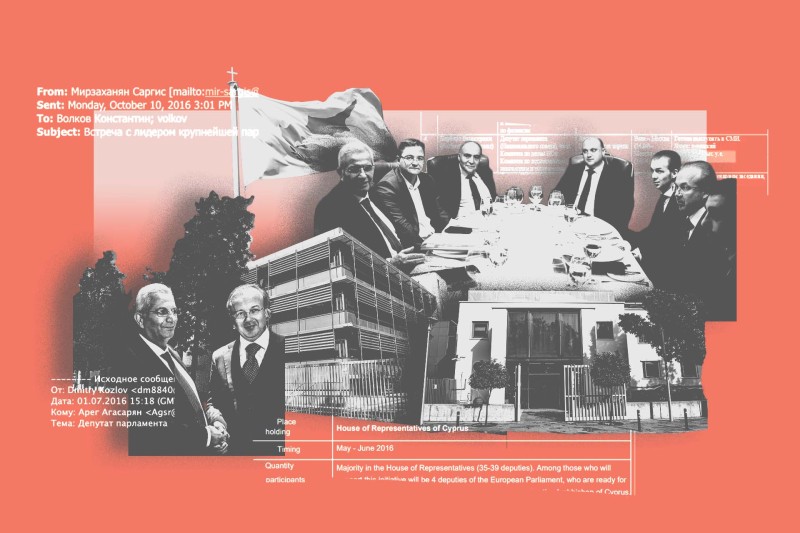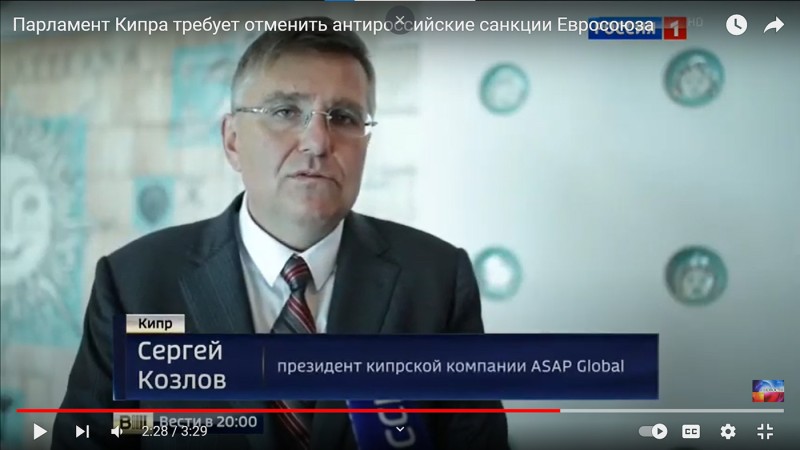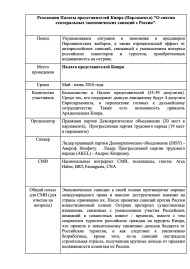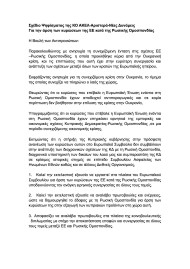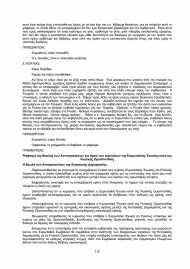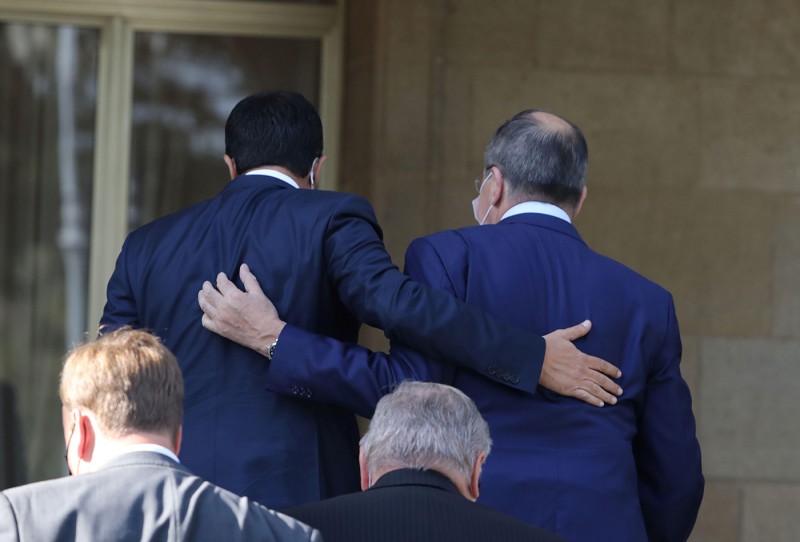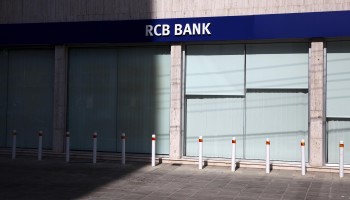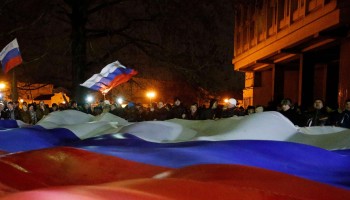Russian President Vladimir Putin scored a major PR coup in July 2016 when the parliament of Cyprus asked the country’s government to work towards lifting European Union sanctions imposed on Russia after its annexation of Crimea.
Even for Cyprus, one of the most pro-Moscow countries in Europe due to the large amount of Russian capital its financial services sector attracted, this raised eyebrows, with Ukraine’s foreign ministry quickly condemning the move and saying it was “nothing but indirect support of the aggressor.”
But the truth was even more shocking than anyone guessed at the time: The resolution adopted by the Cypriot parliament had been planned by a Kremlin-linked lobbying group that dubs itself the International Agency for Current Policy, and put forward by Cypriot politicians courted by the lobbyists.
Transparency International's corrupt money flows expert Maira Martini said the new revelations underscored longstanding concerns over the “economic capture of [Cyprus] by Russian interests.”
The Russian resolution was discovered as part of an investigation by OCCRP and its partners Eesti Ekspress, IrpiMedia, and Profil, based on thousands of leaked emails, on how the lobbying group arranged payments for friendly European politicians in exchange for their help pushing pro-Russian motions like the one in Cyprus, largely focused on legitimizing Russia’s annexation of Crimea.
The group, run by Russian parliamentary staffer Sargis Mirzakhanian, achieved successes elsewhere in Europe, but the Cypriot resolution might have been the most striking, since it appears to have been instigated and coordinated behind the scenes by the Russians. The House of Representatives of Cyprus was the first national body to pass one of the Agency’s canned resolutions, scoring a major victory for Putin and his supporters.
Mirzakhanian and other leading figures in the International Agency for Current Policy did not respond to requests for comment.
The leaked emails also reveal the key role played by Dmitry Kozlov, son of a prominent Russian-Cypriot businessman, in helping the International Agency for Current Policy win influence in Cyprus. Kozlov was in frequent communication with Mirzakhanian’s associate Areg Agasaryan, the leaked emails show, and he brokered contact between Mirzakhanian’s group and at least one Cypriot politician. He even played a role in setting up a political party called Ego o Politis, or “I, the Citizen” — known colloquially in Cyprus as “The Russian Party” due to its pro-Kremlin stance.
The Kozlov family ran businesses in Cyprus geared toward helping Russians invest and migrate to the Mediterranean island, including a 29.5-million-euro residential development near the seaside city Limassol, a popular destination for Russian tourists and expats.
Dmitry Kozlov’s father, Sergey, and his wife also owned Admare Properties Ltd, a company that helped foreigners apply for Cypriot citizenship under the country’s “golden passport” scheme, which was shuttered in 2020 after being exposed as corrupt. Sergey and Dmitry also acquired Cypriot citizenship under the scheme.
Dmitry Kozlov conceded he was “involved” in the process of passing the parliamentary motion, but said he did not have “any specific role.” He said he knew Agasaryan “from university years,” but had met Mirzakhanian just once.
Despite being interviewed at parliament on the day the motion was passed, Sergey Kozlov told OCCRP he was not involved in planning the resolution and only knew Agasaryan and Mirzakhanian as former classmates of his son. “I’m not a political person,” he said. “Any personal involvement…at that time it was natural, as (someone) who has double nationality in a third country.”
Sergey Kozlov speaks to the media at the Cypriot parliament the day the motion was passed.
Playing Politics
In late April 2016, Agasaryan emailed Mirzakhanian a document titled “Resolution of the House of Representatives of Cyprus (Parliament) ‘On lifting sectoral economic sanctions against Russia.’”
It set out a plan to get a resolution passed that would describe EU sanctions against Moscow as “fundamentally contrary to the norms of international law,” and to drum up media coverage that would highlight the economic damage done to Cyprus by the loss of business with Russia.
The plan aimed to secure votes for the motion from “35-39 deputies” from Democratic Rally, the party of Cypriot President Nicos Anastasiades, and the communist party AKEL, a traditional ally of Moscow.
Dmitry Kozlov told OCCRP that the idea for a Cypriot resolution against anti-Russia sanctions came about after Agasaryan called him and mentioned a similar resolution that had just passed in Italy.
“After hearing of this I thought it would be a good idea to check with the parliamentarians of Cyprus [to see] if they share the same opinions and approach,” he said.
Kozlov said he then reached out to the leader of Cyprus’s AKEL party, Andros Kyprianou, but insisted he “did not lobby” him. Kyprianou, he said, also seemed interested in the idea of a pro-Russia resolution.
Then, he said, “As I was aware that such a resolution might take place, I called Areg and shared this information with him.”
On June 29, 2016, Agasaryan sent Mirzakhanian an email that included a preview of the draft resolution carrying the signature of the parliamentary faction of AKEL.
On July 7, a nearly identical resolution was passed in the Cypriot parliament , with just a few minor changes. The motion passed with 33 votes in favor — just short of the Russians’ goal.
You Say You Want a Resolution…
Mirzakhanian appears to have had a tight grip on managing how the proceedings were covered: The day before the vote, he forwarded the details of several journalists from Russian state media and Russian outlet LifeNews for accreditation to Kozlov’s son, Dmitry.
The wooing of AKEL continued later in 2016, when the party’s leader, Andros Kyprianou, traveled to Moscow and met with Andrey Nazarov, the co-chairman of the business group Business Russia. Nazarov also chairs the Yalta International Economic Forum, an annual event promoting investment in the illegally annexed Crimea, which Kyprianou attended in 2017.
Kyprianou (far left), Dmitry Kozlov (second from left) and Nazarov (second from right) in Moscow in October 2016.
Sergey Kozlov also donated 15,000 euros to AKEL in 2016, making him the party’s seventh biggest donor that year. (He told OCCRP he had donated funds to “all political parties for charity purposes” during his 25 years in Cyprus.)
Kyprianou told OCCRP that Dmitry Kozlov had pressured him to meet Nazarov in Moscow, and that while there he had also met Russian Foreign Minister Sergey Lavrov. He claimed he had been unaware that the resolution on Russia was coordinated by Mirzakhanian’s team.
Kyprianou admitted that Kozlov’s donation to AKEL “may have been a way to thank [us] for the resolution” but that “it wasn’t me they gave the money to.” He said he had attended the Yalta forum once, but declined a subsequent invitation to attend the Yalta forum because he was uncomfortable with what he saw there. “They had gathered there all the far-right movements of Europe,” he said.
The co-sponsor of the resolution, Yiorgos Lillikas, who served as minister of foreign affairs from 2006 to 2007, told OCCRP he had never heard of Mirzakhian, but that he backed the resolution to thank Russia for the support it had given to Cyprus in the past.
Dmitry Kozlov went further than just backing existing political parties. In 2017, he helped Russian interests on the island set up one of their own.
On June 14, 2017, over a month before Ego o Politis was officially registered, Agasaryan forwarded an email from Dmitry Kozlov to Mirzakhanian containing several attachments setting out the party’s positions.
“Areg, good afternoon!,” Kozlov wrote. “In continuation of our telephone conversation, I am sending you the main documents on the political party that we are creating. They include the main program of the party, as well as the reforms that we plan to carry out.”
Kozlov added that he and his associates had “met with a number of Russian deputies who support us” and said that “Mr. Lavrov” — Russia’s controversial foreign minister Sergey Lavrov, one of the main drivers of Russia’s invasion of Ukraine — also “gave his blessing.”
Dmitry Kozlov told OCCRP he resigned from Ego o Politis soon after its creation, which came about following a suggestion by one of his “acquaintances.”
Proof that Russian interests were behind the creation of the party increased already-significant concerns about Russian political influence in Cyprus, said Transparency International's Martini.
Cypriot Foreign Minister Nikos Christodoulides welcomes Russian Foreign Minister Sergei Lavrov to the Presidential Palace in Nicosia, Cyprus, in September 2020.
“We know that kleptocrats have tried to influence foreign elections to ensure they have people inside the government protecting their interests,” she said. “But revelations that Russian interests could have set up their own political party in Cyprus is even more concerning.”
Ego o Politis suspended its operations in November 2021 and was struck off the registry of political parties. Despite not contesting any election during its brief life, it managed to generate headlines in 2020 when it allegedly sought to have a statue of Vladimir Lenin that had once stood in Kyiv brought to Limassol.
While its official website was taken offline, the party’s Facebook page continues to operate. It frequently shares posts promoting the presidential candidacy of former Cypriot Foreign Minister Nikos Christodoulides in elections scheduled for February 5. Christodoulides vetoed sanctions targeting Belarusian leader Aleksander Lukashenko, a crucial Moscow ally, in September 2020.
